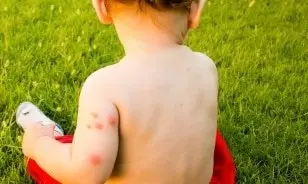Emergency Room for Allergic Reaction To Bug Bites and Stings in Houston, TX
Bug bites and stings can cause serious allergic reactions, particularly in individuals sensitive to insect venom. At Village Emergency Centers, we provide expert bug bite allergic reaction treatment in our fully equipped emergency rooms in Houston. Whether it’s a bee sting, mosquito bite, spider bite, or other bugs in Houston, our team offers fast, effective relief. Don’t wait—walk into one of our centers for immediate care available 24/7.


Why Choose Us?
Why Choose Village Emergency Centers for Allergic Reaction Treatment?
At Village Emergency Centers, we provide expert care for allergic reactions to bug bites and stings with the following advantages:
Experienced ER Physicians: Our board-certified emergency physicians specialize in treating allergic reactions and can deliver immediate care for life-threatening cases like anaphylaxis.
24/7 Availability: Our emergency rooms are open 24/7, ensuring that help is always available when you need it most.
Fast, Walk-In Care: You don’t need an appointment—walk in anytime to receive immediate treatment from our highly skilled team.
How We Treat Allergic Reactions to Bug Bites and Stings in Houston TX
Our approach to treating allergic reactions to bug bites and stings is fast and thorough. When you arrive at one of our emergency rooms, our medical team will:
Assess the Severity
We’ll quickly determine if your reaction is mild, moderate, or severe.
Administer Epinephrine
For anaphylactic reactions, we provide an epinephrine injection to halt the reaction and stabilize your breathing.
Provide Antihistamines
Antihistamines are used to reduce swelling, itching, and hives, helping you feel relief faster.
Monitor Breathing
In cases of difficulty breathing, we may provide oxygen or other respiratory support.
Follow-Up Care
After immediate treatment, we will discuss next steps, including prescriptions or a referral to an allergist for future prevention.
Common Allergic Reactions to Bug Bites and Stings We Treat
Village Emergency Centers handles all types of allergic reactions, including severe and life-threatening cases. Here are some common symptoms we treat:
Anaphylaxis
A severe allergic reaction causing difficulty breathing, swelling of the throat and tongue, and a drop in blood pressure, which requires immediate care.
Swelling and Pain
Localized swelling around the bite or sting site that may spread, causing discomfort and restricted movement.
Difficulty Breathing
We provide appropriate medications for pain relief, anti-nausea, or preventive treatments for chronic headache sufferers.
Dizziness or Fainting
Sudden drops in blood pressure or dehydration can cause light-headedness or fainting, requiring ER attention.
When to Visit Village Emergency Centers for Allergic Reactions
Knowing when to seek emergency care for a reaction to a bug bite or sting is crucial. At Village Emergency Centers, we recommend you come to our 24 Hour walk-in urgent care for allergic reaction if you experience any of the following:
These symptoms could indicate conditions like concussions, brain hemorrhages, or infections, which require prompt treatment.
Emergency or Walk-In Care for Allergic Reactions?
If you’re unsure whether your reaction requires ER care or can be handled with walk-in urgent care, remember that Village Emergency Centers offers both options. We provide fast and reliable care no matter the severity of your symptoms. Mild reactions may be managed in our urgent care facilities, while more serious reactions, such as anaphylaxis, are handled in our fully-equipped emergency rooms.
Visit Village Emergency Centers for Bug Bites and Stings Treatment
If you’ve had a bug bite or sting and are experiencing symptoms of an allergic reaction, don’t wait. Visit Village Emergency Centers for fast and reliable treatment. Our walk-in urgent care and ER services are available 24/7 to provide expert care for a variety of conditions, including allergy to insect bites and stings, Headache, UTI, Falls & Injuries, Chest Pain, Sprains, Pain Management, Cold Allergies, and Abdominal Pain. We’re here to give you the care you need, when you need it most. Visit one of our conveniently located emergency rooms in Houston today.
FAQs About Allergic Reactions

What Our Patients are Saying About Our Emergency Care Services
Amy Trim
League City
“This emergency room is absolute AMAZING. Both my husband & I have been treated here & have had phenomenal experiences. They always treat you with love & respect. They run all of the tests that are needed, but they don’t add a bunch of unnecessary test. We all know that doctors are human, but sometimes I think some doctors forget that but not at Clear Creek Emergency Room. Dr. Luna, Dr. Cruz, and Rommel, RN are amazing!”
Keyla H
Clear Creek
“I recently had an experience at the Clear Creek Emergency Room that exceeded my expectations. The staff was incredibly fast and efficient, ensuring that I received the care I needed without unnecessary delays. I was particularly impressed by great bedside manner of Doctor Cruz and highly skilled nurse Rommel who attended to me. I truly appreciate the dedication and efficiency of the entire team. Thank you for providing such exceptional care!”
Isela Luna
Jersey Village
“I was pleased to know there’s a place to get urgent care when needed. I was taken care off promptly and efficiently. Dr. Luna treated me with respect and was very informative about my health condition. I actually was in and out of there in 3 hours. Everything was explained to me and I am happy to know there’s a place like this Jersey Village ER. Hopefully, I will not need to return but if I need to I know I will get great care. Thank you Dr Luna and staff.”
